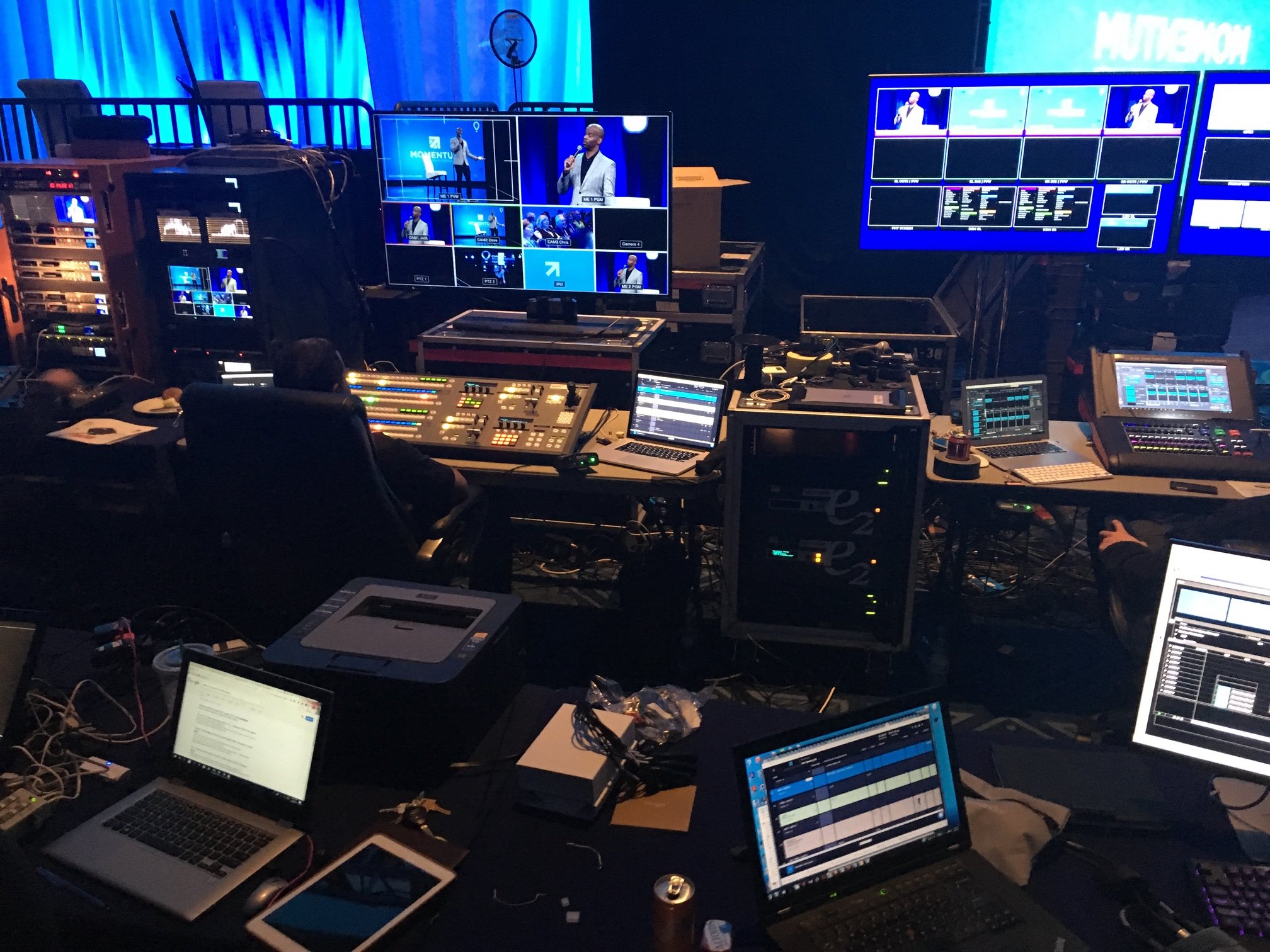How Event Production Functions: A Comprehensive Take A Look At the Process
Event production is a facility and structured procedure that requires cautious planning and implementation. It starts with developing clear goals and comprehending the target audience. Each step, from budgeting to location selection, plays a vital duty in guaranteeing success. As the procedure unravels, various elements need to align perfectly. The nuances of this detailed procedure frequently go undetected. What are the key stages that add to an unforgettable event?

The First Drawing Board
When beginning on event production, careful planning is necessary to ensure an effective outcome. The preliminary planning phase functions as the foundation for all succeeding initiatives. Throughout this stage, event manufacturers should define the event's objective and goals plainly. Determining the target audience aids customize the experience and messaging, assuring significance and engagement.Producers need to additionally consider the event style, whether it be in-person, digital, or hybrid, as this will certainly affect various logistical components. Choosing a suitable day and location is critical, as it influences availability and availability.Furthermore, setting up a dependable team is essential for separating responsibilities and simplifying interaction. Establishing a timeline with milestones assurances all tasks are finished on time. This phase includes comprehensive research study, including identifying prospective difficulties and designing methods to alleviate dangers. Inevitably, a well-structured first planning stage establishes the tone for a successful event production journey.

Budgeting and Resource Allotment
In event production, effective budgeting and source allowance are vital for success - event production charlotte. Developing economic criteria sets the foundation for all subsequent decisions, while source distribution methods guarantee that every element of the event is effectively sustained. With each other, these components assist maintain control over expenditures and optimize using offered resources
Developing Financial Parameters
Developing financial specifications is vital to the success of any kind of event production, as it sets the structure for reliable budgeting and resource allocation. This procedure starts with specifying the total budget, which encompasses all aspects of the event, consisting of location costs, event catering, and advertising and marketing. By recognizing readily available funds, event organizers can prioritize expenses and designate resources as necessary. Additionally, it is important to carry out detailed marketing research to anticipate potential costs and determine financing sources, such as sponsorships or ticket sales. Establishing clear economic criteria additionally help in risk management, permitting coordinators to reserve contingency funds for unexpected expenses. Eventually, a distinct budget works as a roadmap, guiding the event production group in the direction of accomplishing their objectives while maintaining financial control.
Resource Circulation Techniques
Effective resource distribution approaches are essential for taking full advantage of the impact of an event while sticking to spending plan restrictions. Effective event production requires a precise strategy to budgeting and source allotment. Coordinators must prioritize necessary components such as location, catering, and innovation, making sure that funds are assigned to areas that enhance guest experience. A thorough spending plan ought to describe anticipated costs and identify locations for prospective expense savings, such as bargaining with suppliers or exploring sponsorship opportunities. In addition, tracking expenditures throughout the preparation process assists prevent overspending. By utilizing calculated source circulation, event manufacturers can provide a remarkable experience while keeping financial obligation, inevitably adding to the overall success of the event.
Location Choice and Logistics
Choosing the right location is important to the success of any kind of event, as it sets the stage for the total experience. Venue selection entails assessing different aspects, including capacity, access, and place. Planners need to take into consideration the target market and the nature of the event, making sure the place lines up with the event's goals.Logistics play a substantial role in this process, including plans for seating, audiovisual devices, and catering solutions. A well-chosen venue needs to assist in smooth flow for participants and personnel, boosting engagement.Additionally, examining potential venues for services like parking, bathrooms, and emergency situation leaves is crucial for safety and security and ease. The timeline for safeguarding the venue is additionally essential, as preferred locations might book rapidly - event production charlotte. Extensive planning and timely implementation can inevitably contribute to a seamless event experience, making venue selection and logistics essential elements of successful event production.
Innovative Principle Growth
While the place establishes the physical phase, creative principle development forms the event's identity and story. This process begins with recognizing the event's function and target market, enabling event producers to develop a compelling motif that reverberates with participants. Brainstorming sessions often include diverse perspectives, promoting innovative concepts that align with the event's goals.Once a style is developed, aesthetic elements such as shade palettes, signage, and style are developed to boost the general environment. Storytelling methods might additionally be integrated to create an engaging journey for participants, assuring a remarkable experience. Additionally, considerations regarding entertainment, tasks, and interactive parts are lined up with the selected principle, reinforcing the style throughout the event.Ultimately, reliable creative idea advancement assurances that every aspect of the event functions cohesively, leaving a long lasting perception on participants and fulfilling the event's purposes. This fundamental job lays the foundation for succeeding preparation and execution stages.
Working together With Suppliers and Providers
Successful event production depends upon effective partnership with suppliers and suppliers. Selecting reliable companions, discussing contracts properly, and making sure prompt deliveries are critical action in this procedure. Each of these aspects adds substantially to the general success and smooth implementation of an occasion.
Selecting Reliable Partners
Exactly how can event coordinators ensure a seamless production experience? Picking dependable companions is essential in achieving this goal. Event coordinators should carry out complete study to determine vendors and suppliers with a tested track document of excellence. This includes checking referrals, examining profiles, and examining customer comments. Planners should prioritize partners that demonstrate professionalism and reliability, prompt interaction, and a desire to work together. Building solid partnerships cultivates trust and enables fast problem-solving throughout the event. In addition, it is useful to choose local suppliers who comprehend the location and local logistics. Inevitably, an effective event hinges on the synergy more info here in between planners and their partners, guaranteeing that every element of production runs smoothly and successfully.
Discussing Agreements Successfully
Effective arrangement of contracts is a crucial action in the partnership in between event organizers and their vendors and vendors. This procedure includes clear interaction of assumptions, deliverables, and timelines. Organizers need to perform thorough research study on market rates and sector criteria to establish a standard for arrangements. It is vital to create a collective atmosphere, motivating open dialogue about terms, prices, and prospective contingencies. Coordinators ought to additionally focus on recognizing the vendor's abilities and limitations to align their demands properly. Flexibility can bring about mutually useful arrangements, fostering lasting relationships. Crafting well-defined contracts that consist of certain performance metrics can help ensure responsibility, eventually causing successful event implementation and fulfillment for all parties entailed.
Ensuring Prompt Deliveries
Timely distributions are essential for the smooth execution of any type of event, calling for attentive partnership in between planners and their suppliers and suppliers. Reliable interaction is vital, as it assists establish clear assumptions regarding distribution schedules, amounts, and certain requirements. Coordinators typically produce comprehensive timelines to lay out important milestones, making certain all events remain lined up throughout the procedure. Normal check-ins with vendors can assist recognize potential hold-ups early, permitting for proactive services. Additionally, building strong relationships with trusted vendors cultivates trust fund and liability, which can result in much better service and prioritization. By prioritizing these joint initiatives, planners can minimize disruptions, therefore improving the general efficiency of event production and guaranteeing that all needed products and services get here as intended.
Advertising and Promo Strategies
While arranging an event, the success of advertising and marketing and promo strategies can substantially influence presence and involvement. Efficient techniques frequently include a mix of digital advertising and marketing, traditional marketing, and grassroots outreach. Using social media systems permits real-time communication and targeted marketing, reaching details demographics successfully. Email marketing projects can additionally company website involve potential guests with personalized content and reminders.Collaborations with influencers or market leaders can also improve credibility and broaden reach. Developing interesting content, such as video clips or blog sites, assists to generate buzz and suffer passion leading up to the event. Furthermore, leveraging early-bird discounts and exclusive advantages can incentivize ticket purchases.Promoting through typical channels, such as posters or regional media, stays relevant, specifically in community-focused occasions. An extensive strategy that incorporates numerous methods guarantees optimum presence and interaction, eventually adding to the event's success and the creation of a memorable experience for guests.
On-Site Execution and Management
On-site execution and management are essential elements that establish the overall success of an event. Efficient coordination during the event assures that all components align with the prepared program. Event managers look after logistics, including supplier sychronisation, devices setup, and visitor services. Keeping an eye on timelines and resolving any unexpected concerns are essential for preserving a seamless experience.The team plays a considerable function, as qualified employees are accountable for different jobs such as registration, info dissemination, and technological support. Communication amongst employee is crucial; it fosters a collective setting and enables quick resolution of challenges.Additionally, security procedures should be abided by, guarding the well-being of all attendees. Post-event examinations are additionally component of on-site monitoring, giving insights for future improvements. By focusing on these facets, event producers can produce remarkable experiences that satisfy or exceed attendee expectations while accomplishing the event's goals.
Frequently Asked Inquiries
Exactly how Do I Pick the Right Event Motif?
Picking the right event theme entails considering the target market, event function, and location. Looking into existing fads and collecting input from stakeholders can additionally inspire imaginative concepts click this that reverberate and create an unforgettable experience.

What Prevail Errors in Event Production?
Common mistakes in event production usually include poor preparation, inadequate communication amongst team members, spending plan mismanagement, neglecting to take into consideration the target market's demands, and falling short to carry out a complete post-event analysis for future improvements.
Just How Can I Measure Event Success?
To determine event success, one can assess guest satisfaction, involvement degrees, budget plan adherence, and post-event comments. Secret performance indicators, such as ticket sales and social networks communications, additionally provide useful understandings right into general performance.
What Should I Do if It Drizzles on the Event Day?
In the event of rain on the day, the organizer must carry out backup strategies, such as securing tents or relocating tasks indoors. Interaction with attendees about changes is vital to guarantee a smooth experience despite weather difficulties.
How Can I Ensure Guest Engagement Throughout the Event?
